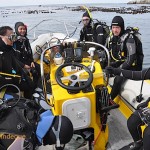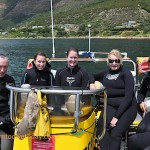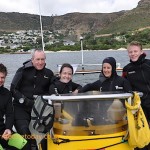Hey dive buddies! Thank you for a year of amazing dives and good friendships. Please find yourself in this selection of happy diver photos taken in 2013. I’m sorry we don’t have one from every single dive we did. We look forward to many more good dives together in 2014!
Category: Independent instructors
A better sign
We upgraded the sign on our gate. Now we’re easier to find!

Installing a pool
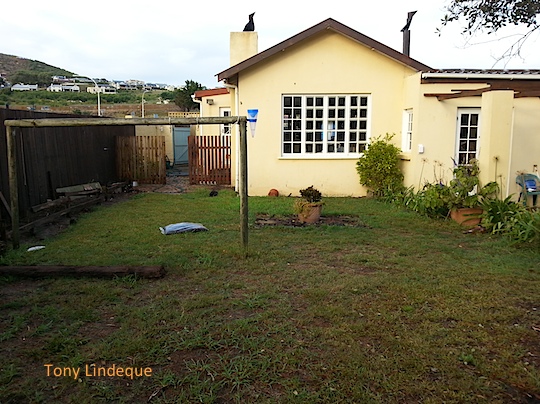
At the end of September 2012 Clare and I moved from the duplex in Kenilworth, where she was living when I moved to Cape Town, to a more spacious home on the edge of Sun Valley close to Fish Hoek. We love living in the South Peninsula, close to the sea and mountains. We have a large garden populated by Western leopard toads, frogs of all kinds, mole snakes, field mice, and actual moles of various sizes. Guinea fowl, hadedas, white eyes, grey herons, jackal buzzards, owls, sunbirds and a host of other feathered creatures pass through on a regular basis.

Starting in late April we installed a 5 x 3 metre swimming pool in the back garden, with the intention of using it for dive skills training as well as for our own leisure purposes. It is salt chlorinated and will eventually be surrounded by a wooden deck and equipped with some solar heating equipment to warm the water using the sun’s rays. In the mean time, an energy saving pool cover keeps it clean and warms the water by up to four degrees.
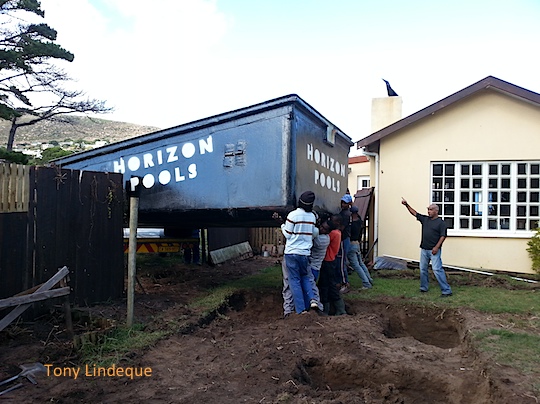
The process of installing the pool was actually very quick, and I enjoyed watching the hole being dug, the shell arriving and being positioned, and the sand being filled in around the fibreglass shell. We used all the sand dug out of the hole to level the garden, which is now looking (and feeling) much larger and less likely to cause a twisted ankle on one of the sloping areas. Here are some photos I took while the pool was being installed.
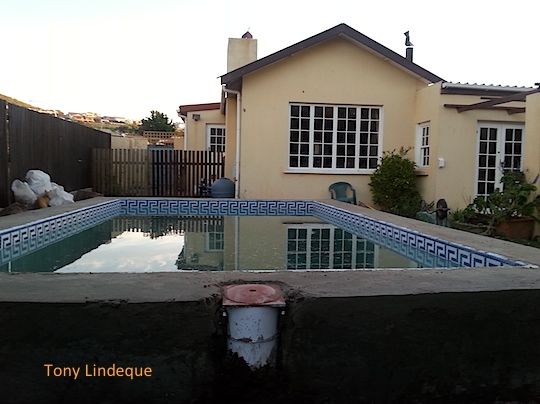
A week or so after installation I took my first group of students in the pool – two Open Water students and a Discover Scuba Diving candidate. It’s great not to have to drive to Wynberg to use the pool there any more! I’m happy to report that this particular independent instructor (and SDI Resort Dive Centre) is more independent than ever.

We wouldn’t recommend the particular company that put in our pool if you’re considering having one done yourself, but with a bit of work from me the finished product is great.
Signs of change

If you come and visit us, look out for the sign on the gate. It’s small, but visible. We’re now an SDI Resort Dive Centre, offering both SDI and PADI training and boat charters.
FAQ: What’s the difference between an Independent and a Freelance instructor?
It is important to establish the credentials of your diving instructor and it is equally important to establish whether he/she is an independent or freelance instructor.
An independent is just that, an instructor who can take you right through the course without being dependent on a dive centre for equipment, training material or training aids.
A freelance instructor will need to rely on the availability of gear and training aids from a dive centre. A freelance Instructor will not be able to guarantee the same gear, wetsuit, mask etc. that you have used in the pool when you do your sea dives as they are rented and may therefore be out with another diver when you need them.
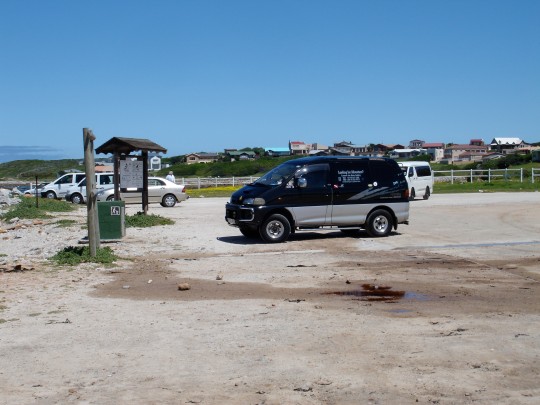
To be an independent instructor you need to be able to operate independently of any dive centre. This means you will need:
- to have your own rental gear: regulators, BCDs , wetsuits, cylinders, fins, masks, and possibly even a compressor; and
- to be able to find students, discuss and plan their course schedule entirely independent of a dive centre schedule and without relying on someone else’s training aids. For example if you are going to sign up for an Enriched Air/Nitrox course will there be a Nitrox analyser? If you plan to do night diving you will there be torches available, glow sticks, and strobes? Search and Recovery dives will require slates, reels and a lift bag. Being an independent instructor requires a certain degree of self-sufficiency.
(Often, independent instructors or freelance instructors open dive centres themselves. This transition usually comes with having a retail outlet and often the main focus is then diverted from teaching diving to paying the rent. Sales become more of a focus and they then arm themselves with freelance instructor contact details so anyone wanting to do a course can be accommodated.)
When you’re signing up for a dive course, this is a useful distinction to be aware of, and you should ask your instructor about whose kit he uses, and whether he’s dependent on a dive centre in any way.
Dive Deals column: Dive course pricing
Here’s the final installment of my three-part series on the cost of learning to dive, originally published on the DiveDeals.co.za website. Part one can be found here, and part two is here.
Dive course pricing
For the past two weeks we’ve been looking at the topic of how much it costs to learn to dive. We’ve seen that there are multiple “invisible” costs that even the largest, most established dive centre must bear in order to deliver an Open Water course. But how does everything tie in with what you’ll actually get charged for an entry-level dive course?
Let’s say Dive Centre #1 wants to charge you R5,000. The equipment is top class, they have every size of gear you require, and a nice environment for training with a great pool. Everything is just perfect, the class is small – perhaps two of you – your instructor is going to earn R1,000 for his three or four days’ work at R250 a day and let’s assume he/she is happy with that.
At the end of the course, in the shop, you will most likely be shown all the types of gear you were using during the course and in a no pressure environment you will choose and buy the gear they suggest. You go home qualified as a diver, have your own gear and hopefully at least 5-6 hours of bottom time to your name. Everyone is happy.
But then there is the other option… You saw that “special offer” at Dive Centre #2 for the same dive course, but for R1,000.
How can they do it for this price, you may ask? More likely, you will ask yourself, why not take this offer instead of paying R5,000?
Before jumping in head first, you should ask yourself these questions.
- Will I get a training manual of my own, or just a copied one? You may not know this, but many dive certification agencies require in their standards that each student has their own, original copy of the training material.
- Will the gear be good? How will you know what good or bad is before you have ever tried it? (Why is my wetsuit torn and ragged? The boots are a bit tight, the fins don’t match, the air tastes funny, my mask leaks a lot, the BCD leaks but my instructor says it’s normal…) How would you know if you’ve never dived before? You struggle with mediocre gear of dubious origins and your instructor will say that’s why it’s good to have your own gear.
- There are probably eight or more students in your class and the Instructor spends very little time with each student. How long will you have to wait to start the course? Can you start immediately, or do you have to wait for seven other people to sign up first?
- At that price it’s doubtful the Instructor is being paid more than R50 a day for working with you. How much of your current day’s work would you do if you were being paid R50? You will be lucky if any of your dives are longer than 20 minutes.
- You can bet that the businesses goal of making a profit will be realised by selling you as much equipment as possible as quickly as possible for the highest price possible. You can be sure that if your pool sessions are a disaster because your mask leaks like a sieve, selling you a brand new one will be easy. If you struggle with buoyancy all through the sea dives, selling you ‘’this fantastic top of the range BCD’’ does not take much effort.
There is no such thing as a bad dive course. The formula for a course is cast in stone by the certifying agency. There are bad instructors, and bad dive operations. A bad instructor working for a ‘’budget ‘’ dive school will take you diving in mediocre gear and less than perfect conditions. A good instructor won’t be comfortable with either of those things.
The ‘’dive hyperstore’’ you visit can not guarantee you any better deal than the tiny corner dive resort without a committed and structured program, the right equipment and the right staff. None of these things come cheap, as we’ve seen, so if your dive course is suspiciously inexpensive there are either a few shortcuts in the program or the money will be made up on gear sales or hidden costs (you may have to pay extra for the sea dives, or to rent gear, or to be certified, or all of the above).
There is nothing wrong with gear sales: all divers should own their own kit, but how qualified are you to choose from the huge range available when you have hardly even been in the water? And how can a salesperson really be sure what they are trying to sell you is right for you when they have known you for less than five minutes? Even discount dive courses have invisible costs… in the form of hastily-purchased, unsuitable dive gear that you end up being pressured into purchasing at the end of your training. Don’t be fooled – if it seems too cheap, you’re missing something!
Dive Deals column: The invisble cost of learning to dive
This is the second column in a three part series I wrote for the DiveDeals.co.za website, as part of my regular weekly contribution. Part the first can be found here.
The “invisible” costs of learning to dive
Last week we broke down some of the non-negotiable costs that are included in a course fee for an entry level scuba diving course. Some of them may seem far-fetched. This week I’ll explain why they aren’t.
You may think it costs a dive centre nothing to fill a cylinder. You may be close, but purchasing a compressor and maintaining it costs money. The compressor operator has to be qualified to fill cylinders, by doing a Department of Manpower-approved compressor course. This also costs money. A dive operator who doesn’t own a compressor will need to find a dive centre who does, and pay between R25 and R50 to fill cylinders. None of these are optional costs to a dive instructor.
You may also say, once you have a cylinder it costs nothing to use it. Wrong again: a cylinder needs an annual inspection that costs up to R100, pillar valves need regular services, tank nets wear out, and handles break. These costs aren’t optional.
You may think a dive centre gets equipment really cheap. Some do, but how good is it? And if they get it so cheap why do they want so much money for it when you buy it from them? Dive centres and schools need their gear to be rugged, robust and trouble free so not all choose budget equipment. A half decent dive school will have all the sizes, from XXS to XXL and a few of each of these sizes, this includes booties, wetsuits and fins. A decent wetsuit can cost you R2,000 – R3,000. What do you think it costs for 20 or 30 decent wetsuits?
Nothing you subject to human bodily fluids, regular immersion in salt water, and exposure to sun and sand lasts forever and dive gear is no exception. There is costly maintenance on all dive gear regardless of its quality, so this also is not a variable in course pricing.
A vehicle is required to transport the instructor and the gear to the beach, as is some form of building to house the classroom and training aids, store the gear and park the car.
Lest we forget, you expect to have the undivided (or at least, not too divided!) attention of an Instructor for at least three to four days. For anyone to stand in front of you as a qualified and paid-up in teaching status instructor, he/she has most likely spent around R70,000 and used at least 6 -12 months getting the required training and qualifications. You may not be surprised to learn that they would like to recoup that money.
This is all without a boat. Let’s leave the boats out of this, as it is possible to qualify as a competent diver by doing shore entries.
So we’ve established that learning to dive costs money, and we’ve identified some of the areas where expenses can build up. Next week we’ll try and tie it all together, looking at what it actually costs to dive – what will a dive centre or scuba instructor charge you for a course, and what that implies.
Dive Deals column: The cost of learning to dive
Here’s the third article I wrote for the Dive Deals website. The first two are here and here.
The cost of learning to dive
Anyone starting out on the rewarding and life-changing path of becoming a regular diver will at some point ask ‘’what does it cost?’’.
Like any sport that is equipment-intense, there will be expenses related to getting started. These expenses can be managed and spread out depending on your own situation and the sales skills of your local dive centre.
As a starting point I want to focus on what many will say is the most popular of dive courses and that is Open Water diver.
Most dive training agencies stipulate the required standards and set the basic guidelines as to how their course must be structured and what the requirements for course content, learning materials and minimum standards are. This is not a variable part of the program.
There are variables, however: what brand and configuration of gear, time schedules and training periods are all variables provided they meet the minimum standard. These factors can all be interpreted quite widely – you could end up diving without a hoodie or gloves in a 3mm wetsuit in less than 20 degree water or perhaps you will have a 7mm wetsuit, with a shortie over it, a hoodie, 5mm gloves and so on.
Where no scope for interpretation exists, naturally will follow more expense.
Let’s break it down even more.
Any business irrespective of what it does, exists with the goal of making a profit. Huge turnover don’t always equate with huge profits and many smaller, efficiently run businesses make a tidy profit. So let’s imagine a dive centre with one employee, its main focus being on diver training.
Let’s take the non-variable items first.
You walk in the door and want to become a qualified diver. You don’t want to be conned into doing a seemingly cheap course that will only qualify you to dive to 12 metres while accompanied by an instructor – you want to be able to dive independently, to a reasonable depth. The PADI Open Water course and the NAUI Open Water 1 course, for example, fit the bill nicely. So this is what you will cost the dive operator:
- A training pack with at least the minimum required manual, logbook and dive planner: R450
- Two sets of gear for three days, capitalised and depreciated over a year: R300
- 10 air fills (1 student and 1 Instructor, pool and four dives): R400
- Getting to and from the dive sites: R400
- Wages for the owner/instructor: R850
- Odds and ends such as electricity, pens and pencils, rent, telephone calls, lunch maybe? : R100
(These figures aren’t meant to be prescriptive or even highly accurate, but just give an idea of where expenses occur in running a dive course.)
So it’s not implausible that R2,500 of your course fee is eaten up before you even hit the water. You may look at some of the costs I’ve listed above and say to yourself, “He’s smoking socks – it doesn’t cost a dive centre anything to fill a cylinder! And what’s this about the gear costing R300 over the course days? Dive centres hardly pay anything for gear, and then they have it to use as they please!”
We’ll see next week how some of the “invisible” costs of learning to dive add up.
Dive Deals column: Don’t become a lost diver
Here’s the second in my series of articles for the DiveDeals.co.za website.
Don’t become a lost diver
Last week we looked at some of the situations and reasons that could cause a freshly qualified scuba diver to give up on the sport. This week I’d like to examine some of the simple things that can be done by the qualifying diver – before, during and after doing one’s first dive course – to reduce the attrition rate of new divers and avoid becoming a statistic.
Learning to dive
Firstly, learn to dive in a place you feel comfortable, with an instructor you feel good about. Choose an instructor whom you trust, and find approachable. Ask a lot of questions before you sign up. During the course, never hesitate to tell your instructor you are not sure of something you have just learnt. Don’t be afraid to speak your mind. If you’re not comfortable performing a skill, ask if you can do it again. That skill might one day make the difference between a disastrous dive and a dive that ended well for all concerned.
Buying gear
Don’t buy the first piece of gear you are shown based on the sales pitch. There is very little junk available in the dive industry, but it just might not be what suits your budget, your body shape or diving needs. You WILL ultimately be better off buying your own equipment, but don’t rush into it without some research. Try on different styles of wetsuits, dive with different style BCDs, various volume masks, and so on. Then you will be qualified to make a good decision about what kit to buy for yourself.
On the boat
Do not hesitate to tell the skipper you are nervous, and never hesitate to tell the divemaster it’s your first dive and you are apprehensive. Don’t be shy to tell the group on the beach during the briefing you have never dived in the sea, or never been deeper than 12 metres, or whatever the case.
The divemaster faced with 10 new faces every dive cannot be expected to read everyone’s state of mind. Equally, a skipper that takes 30-40 different people out on his boat each day can’t be expected to know everyone’s gear, mental state, or qualification.
As a divemaster, skipper, and instructor, I can assure you the vast majority of people in the dive industry are helpful, keen to see you dive with them again and again and will go to great lengths to assist you whilst you find your feet. All you have to do is tell them that you’re just starting out. Don’t be afraid to ask the diver nearby for help as they will most likely be happy to share their knowledge. If they aren’t, don’t take it personally – unfortunately you will meet ungracious people in all areas of life – and just ask someone else.
Bad experiences
In the unlikely event you have a bad experience on a dive or with a dive operator, don’t give up move on as there are many, many, options and the vast majority of dive operators are good at what they do, keeping you a happy diver. After all, a dive centre filled with enthusiastic divers is a fun place to be and to these individuals diving will soon become a way of life. Diving has more to offer than any other sport in the world. (My opinion, yes, but shared by millions.)
A long-term test of the compressor

It has been almost nine months since we acquired this little 70 litres/minute compressor. It is Mohnsam compressor unit made in Germany and powered by a 1.9 kW Honda engine. Very compact and well made, it is very portable and has one filling whip. During the time we’ve had it, it has run for a total of 45 hours and has had two services since the service we did when we bought it.
On each service the filter tower has been done, the compressor oil changed and the engine oil changed. The air filter in the motor is a sponge filter which has just been washed each time and the compressor intake has a paper filter element that has been blown clean. There is also a drive belt and a spark plug, but neither of these items have shown any wear and tear
The unit has been trouble free and has proven to be a money well spent. The convenience of being able to fill your own cylinders when you want and where you want to is very beneficial to me and my style of diving. I have filled my cylinders 145 times and this is a saving of around R6,500. I have used a little over 20 litres of fuel on the Honda engine that powers this unit.
When I took my cylinders for their annual visual inspection last month they were in good shape, verifying that this little compressor is pumping clean air, and that frequent drainage is maintaining excellent fill quality.


















